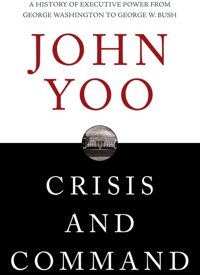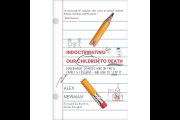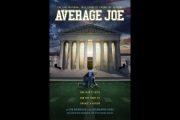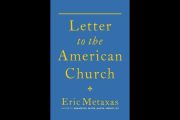
John Yoo’s Crisis and Command is a turgid, 524-page love letter to an all-powerful Presidency generally and to dictatorship specifically. His theme? More Caesar, less Senate.
Infamous for penning the “Torture Memos” under the Bush administration, where he justified torture under the Bush administration by virtually defining torture out of existence, Yoo’s book contends presidential powers are unlimited: “The executive was, rather, the servant of necessity, bound to act in accordance with, in the absence of, or in extraordinary emergencies, in defense of the republic, even contrary to regularly constituted law.” Yes, you read that right. Yoo says the President is above the law.
Yoo criticizes Thomas Jefferson and all who say that the power of the presidency has limits under the U.S. Constitution. The “great” Presidents, Yoo contends, are those who recognize they possess unlimited power, use it, and get away with it politically. Thus he applauds all of the worst excesses of the “great” Presidents Lincoln and Roosevelt, from Roosevelt’s court-packing scheme and internment of Japanese during World War II to Lincoln’s arrest of Congressmen and newspaper editors who disagreed with him during the Civil War. Because a President’s powers are unlimited, a “national emergency” of any kind justifies indefinite detention of Japanese, denial of trial rights to anyone (including American citizens), torture, and warrantless wiretapping. Does the President’s power even extend to the execution of masses of minorities without trial — say, Japanese-Americans during World War II — if the President thinks it’s needed? Yoo doesn’t say. “This presidential power can be used for bad reasons too,” he told the Daily Show’s Jon Stewart. “The Constitution doesn’t prevent people from making poor decisions.” By “people,” he means the President.
Though this pretty much defines the concept of dictatorship, Yoo claims he’s got Founding Fathers who will back him up. He doesn’t, but it is a bit of fun to look a little further into his blatant dishonesty. Yoo repeated a quote (ad nauseum, actually) from Alexander Hamilton in Federalist #23 as justification for his unlimited presidential power theory. In Federalist #23, Hamilton says,
It is impossible to foresee or define the extent and variety of national exigencies, or the correspondent extent and variety of the means which may be necessary to satisfy them. The circumstances that endanger the safety of nations are infinite, and for this reason no constitutional shackles can wisely be imposed on the power to which the care of it is committed. This power ought to be coextensive with all the possible combinations of such circumstances; and ought to be under the direction of the same councils which are appointed to preside over the common defense.
To Yoo, this passage vindicates Presidents who assume unlimited power to command the nation in war, or whatever “emergency” he thinks the nation needs remedied. After all, the President is the “commander-in-chief.”
It sounds convincing until you notice that Federalist #23 doesn’t even mention the President. The full context of the quote Yoo employs so liberally throughout the book is this:
The authorities essential to the common defense are these: to raise armies; to build and equip fleets; to prescribe rules for the government of both; to direct their operations; to provide for their support. These powers ought to exist without limitation, because it is impossible to foresee or define the extent and variety of national exigencies, or the correspondent extent and variety of the means which may be necessary to satisfy them. The circumstances that endanger the safety of nations are infinite, and for this reason no constitutional shackles can wisely be imposed on the power to which the care of it is committed.
All those powers “without limitation” listed in the first sentence of Hamilton’s Federalist essay above are specifically and exclusively delegated to the Congress by Article I, Section 8 of the Constitution, not the President. Hamilton was obviously talking about Congress’ war powers, not those of the President. Tellingly, Yoo doesn’t quote that first part. (Note: All of those powers "without limitation" were later limited by the Bill of Rights, the first 10 Amendments to the U.S. Constitution.)
This raises the question: Can Yoo really be that daft? Can he really read such straightforward declarative English language sentences and honestly come out with the exact opposite of their intent?
The only answer the reader can come to is “no.” Yoo can be credibly labeled a lot of things, but illiterate is not among them. And he can’t even blame the college interns who helped him research the book. Yoo used the same incorrect reference in his 2002 torture memo, for which he was mercilessly pilloried by his critics. Blatant dishonesty is the only remaining possibility.
Yoo is a lawyer, and lawyers love to talk about “interpreting” English as if it were Sanskrit or Swahili that the average human wouldn’t understand. Many lawyers and judges cling to a modern gnosticism that holds only black-robed magi can uncover the hidden meanings in the U.S. Constitution. And it is true that sometimes words can have multiple meanings, but Yoo’s book doesn’t highlight one of those times where we find a sincere difference of opinion over an ambiguous text. Yoo’s quest in Crisis and Command is to obliterate all meaning. Lawyers are famous (or infamous, depending upon your point of view) for extracting meaning from words, sometimes even meanings that aren’t there. Yoo may be the first lawyer to claim that English sentences have no meaning.
Yoo quotes the congressional war powers from the U.S. Constitution, so he’s not unaware of them. They are:
- “To declare war,”
- “To raise and support Armies,”
- “To define and punish Piracies and Felonies committed on the high Seas, and Offences against the Law of Nations,”
- “To make Rules for the Government and Regulation of the land and naval Forces,”
- “To provide for calling forth the Militia to execute the Laws of the Union, suppress Insurrections and repel Invasions,” and
- “To provide for organizing, arming, and disciplining, the Militia, and for governing such Part of them as may be employed in the Service of the United States.”
If that doesn’t leave anything for the President, Yoo remains untroubled. He simply ignores the text of the Constitution. Comedy Central’s Daily Show host Jon Stewart asked Yoo: “Can the President decide when [we] are at war?” Despite quoting the above clearly worded powers in the Constitution in his book, Yoo replied: “Well he can, although Congress can check him. And that’s another thing I try to describe in the book…. All Congress has to do is do nothing. Because they have to fund and approve all of these activities.”
Ah, yes, the old “all Congress has to do is cut off funding to the troops fighting in the battlefield” check to provide balance between the execusitve and legislative branches. As ’60s-era television secret agent Maxwell Smart might have said, “That’s the second time I’ve fallen for it this week.” Cutting off supplies to our sons in the battlefield hardly constitutes a check at all. Cutting funds is political suicide and would only beget warmongering if that were the only check Congress had been given on war. Of course, that’s why Congress was given the additional war powers under the Constitution. More importantly, Yoo’s book actually undermines his own arguments that congressional control over military funding constitutes an effective check: Yoo praises Presidents who spent money for wars without congressional consent. After all, Yoo tediously reminds the reader, the President’s powers are “without limitation.”
Even Alexander Hamilton — that great lover of executive power — explicitly acknowledged that only Congress could bring the nation to war. Hamilton states unequivocally “war is a question, under our Constitution, not of executive, but of legislative cognizance. It belongs to Congress to say — whether the nation shall of choice dismiss the olive branch and unfurl the banners of war.” Since Yoo quoted liberally from this same anonymous correspondence between Hamilton and James Madison over Washington’s neutrality proclamation in Crisis and Command, he can’t claim to be ignorant of Hamilton’s views on the lack of presidential power to bring the nation to war. George Washington, Thomas Jefferson, and James Madison also each wrote explicitly that only Congress can bring the nation to war.
Yoo: Lesson of the Founders Is an Omnipotent Executive
But Yoo ignores men like Madison, who noted that the President is merely empowered to enforce the laws Congress makes. “The natural province of the executive magistrate is to execute laws, as that of the legislature is to make laws,” Yoo quotes Madison as writing, “All his acts therefore, properly executive, must presuppose the existence of the laws to be executed.” Yoo can’t argue with Madison’s logic there, can he? He doesn’t bother. The plain meaning of the Constitution’s text must be ignored, according to Yoo: “This view of the Presidency diminishes its constitutional authority and independence to that of a Clerk-in-Chief whose main duty is to execute Congress’s laws. This interpretation profoundly misreads the political developments around the founding of America and the drafting of its Constitution.”
Yoo explains his view of what those “political developments” were at the time of the founding. The Natural Law? No, Yoo fails to mention it entirely. Inalienable rights of man as “endowed by their Creator”? Nah, the whole concept of individual rights is only discussed in the context of privileges that the President can suspend when he deems it necessary. And forget about any role God has on those rights. God makes no appearance in Crisis and Command, not even a cameo.
Enlightenment writers such as Locke, Montesquieu, and Blackstone are mentioned in Crisis and Command, but Yoo acts as if they had nothing to say about individual rights or God. After all, if you have an unlimited executive, you can’t have inalienable rights. An all-powerful President can’t tolerate an all-powerful God giving out inalienable rights to everyone willy-nilly. The all-powerful presidency is a jealous god. The real lesson of the Enlightenment era, Yoo implies, is a clarion call for the same old unlimited executive power that has existed in every dictatorship in most of the governments throughout world history.
A God who gives out rights to all people by nature of their births and which are inalienable — inseparable — from those people is anathema to Yoo. “It is naïve to say, as Obama did in his inaugural speech, that we can ‘reject as false the choice between our safety and our ideals.’ That high-flying rhetoric means that we must give al Qaeda — a hardened enemy committed to our destruction — the same rights as garden-variety criminals at the cost of losing critical intelligence about real, future threats.” Once again, Yoo claims that government gives out rights, though he implies that it ought not do so. Every freedom-loving American should have cheered Obama’s statement quoted above, even if most experienced patriots had good cause to doubt Obama’s follow-through.
Yoo’s statements would be regarded as the rantings of a deranged post-communist apparatchik in a better time. But the sad truth is that much of the national Republican Party has bought into Yoo’s argument that government, not God, gives out rights, and that government ought not to “give” rights to people we don’t like. One recent example is Massachusetts Republican Scott Brown, who is running a close January 19 election to succeed Ted Kennedy in the U.S. Senate. Brown stated in a television commercial in the week before the election that “some people believe our Constitution exists to grant rights to terrorists who want to harm us. I disagree. Our laws are meant to protect this nation, not our enemies. As your Senator, I will never compromise our nation’s security.” The clear implication of Brown’s campaign ad is that government gives out rights — not God — and that government shouldn’t give them out to people it doesn’t like.
This anti-freedom phalanx within the Republican Party is today the dominant faction of the Party, if we judge it from recent GOP leadership statements or the votes of the congressional rank-and-file on the Military Commissions Act of 2006. Congressional Republican leaders are outraged that the Constitution’s Sixth Amendment requirement for a jury trial may be followed. House Republican Conference Chairman Mike Pence whined to the press January 8: “I think most Hoosiers were appalled to see the Underwear Bomber in Detroit was immediately read his rights, provided an attorney at taxpayer expense, and is now being given access to the due process afforded to American citizens in our criminal courts.” Though Democrats propose to increase government spending and regulations slightly faster than the GOP, the Republican idea that the constitutionally protected right to a jury trial and guarantee against torture should be jettisoned makes economic questions seem a rather trivial matter by comparison. A party that openly defends the unchecked ability of a President to put anyone in a dungeon for torture without even a trial doesn’t deserve support from any freedom-loving person just because that party favors lowering the top income tax rate of the imprisoned man to 33 percent from 38 percent. Some GOP leaders would repeal the entire message of American freedom all the way back to the Enlightenment period of the early 1700s, replacing it with an omnipotent presidency. Yoo is in many respects the founding father of this branch of the GOP.
Fox News Channel Commentator Judge Andrew Napolitano noted recently that “most modern Presidents have contended that their principal job is to keep us safe. They are wrong. The Constitution says that the President’s first job is to keep us free. If he keeps us safe but not free, he is not doing his job.” Napolitano is precisely right. Presidents take an oath to defend the Constitution, not the people. But defending individual rights in the Constitution is — as Obama said in his inaugural address — more or less the same thing as protecting the people. That’s a lesson that people who want smaller government need to learn, or they’ll never get the smaller government they seek.
Crisis and Command, John Yoo, New York: Kaplan Publishing, 2009, 524 pages, hardcover, $29.95.
Photo of John Yoo: AP Images



